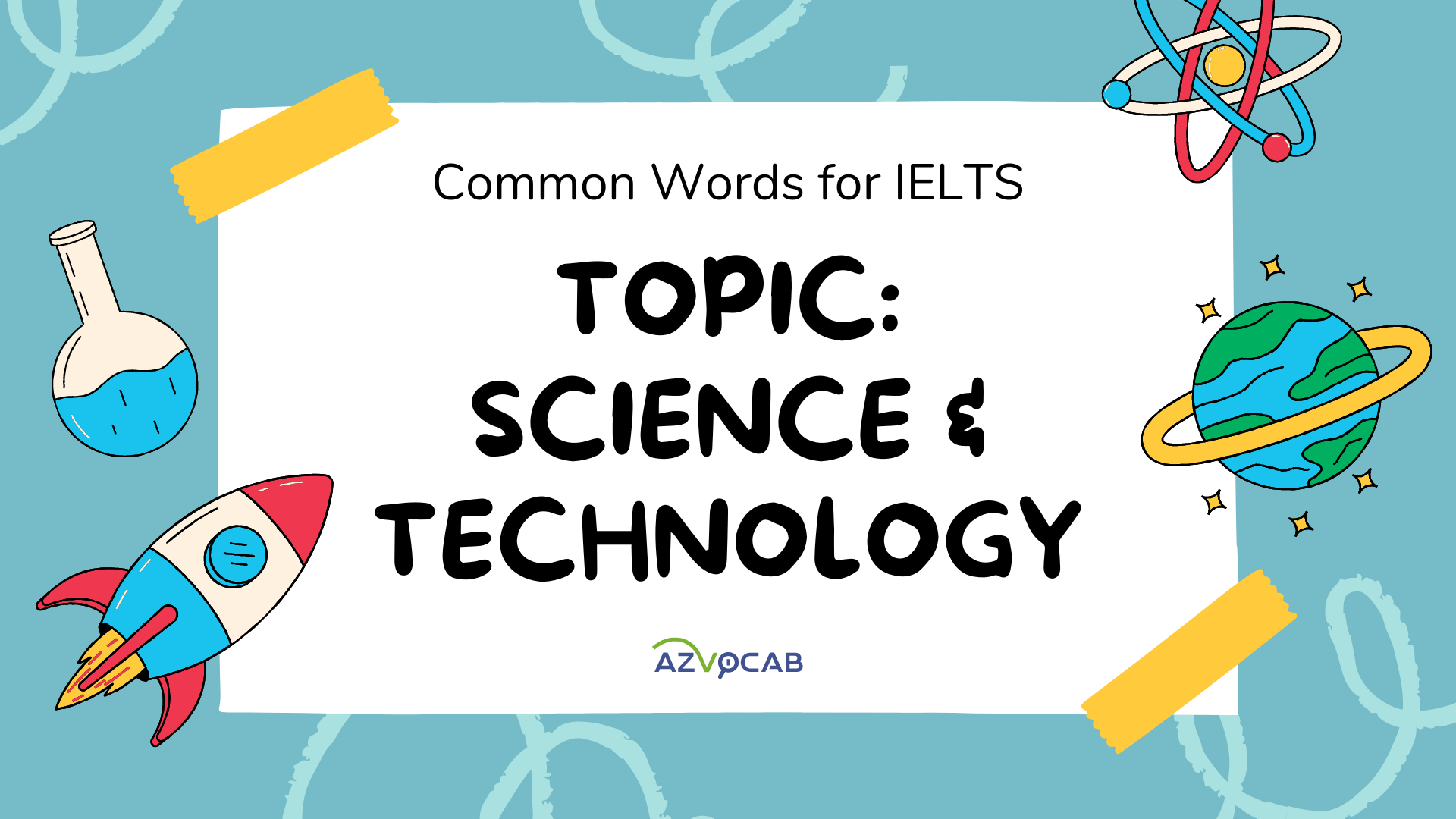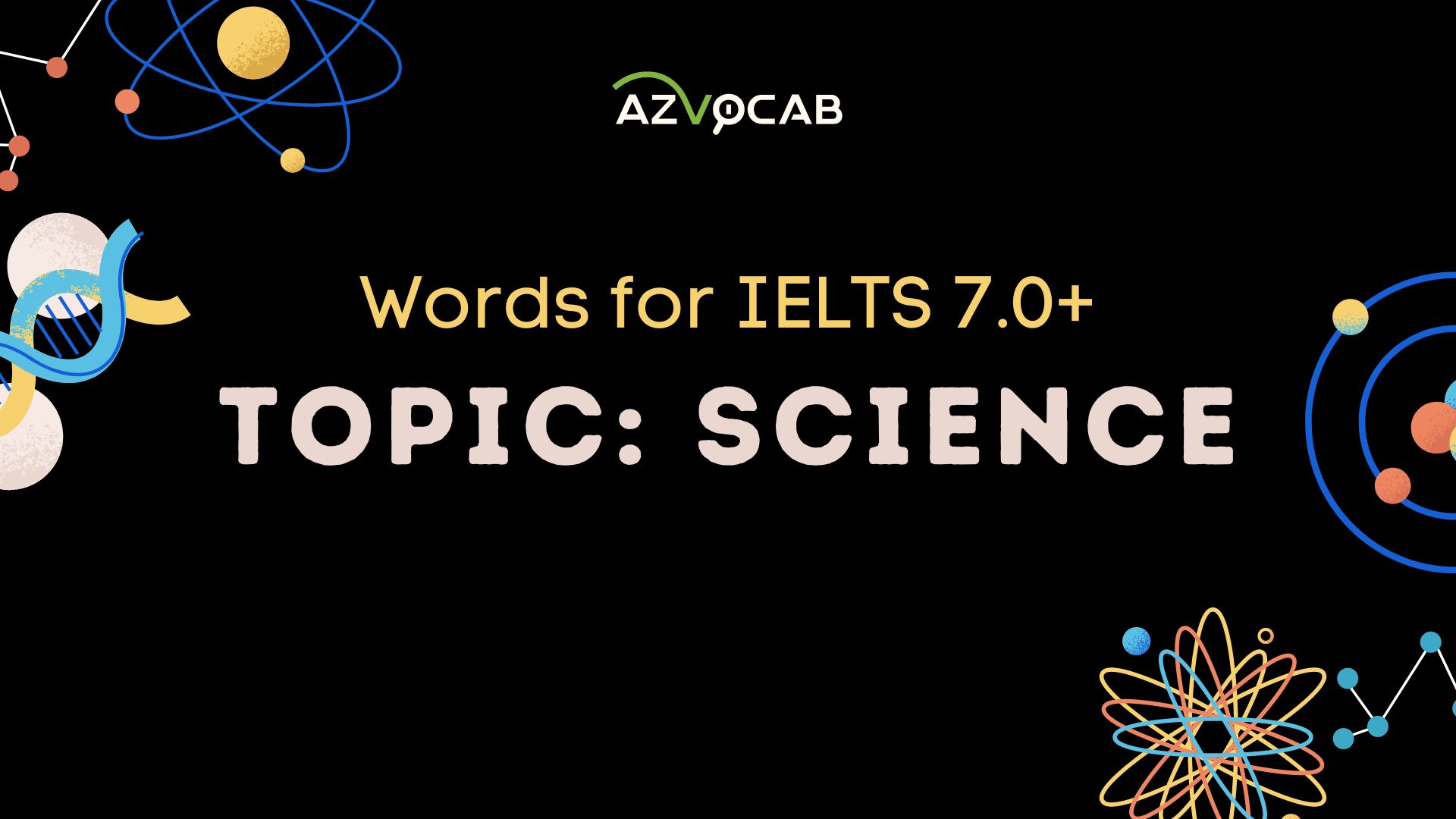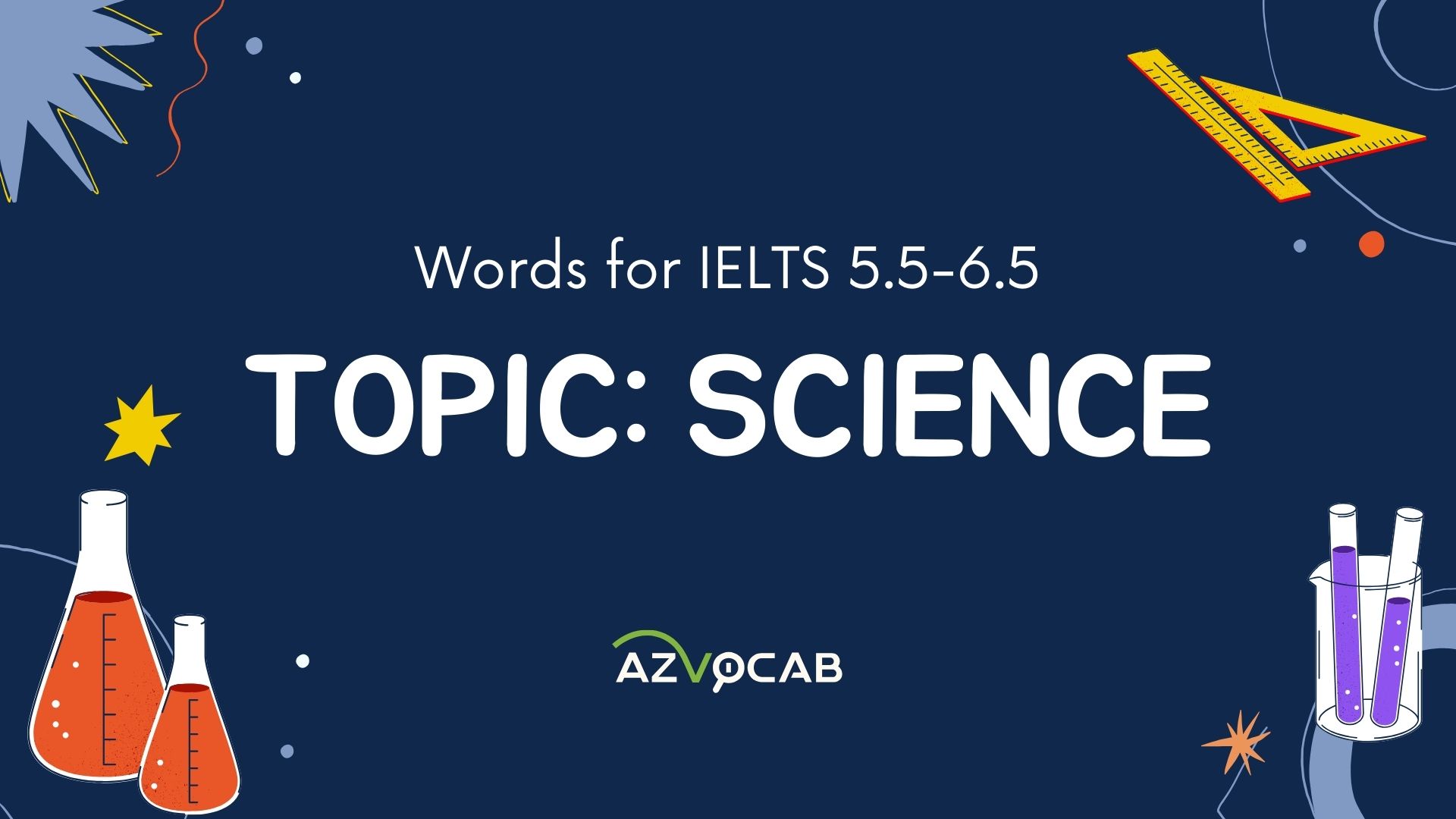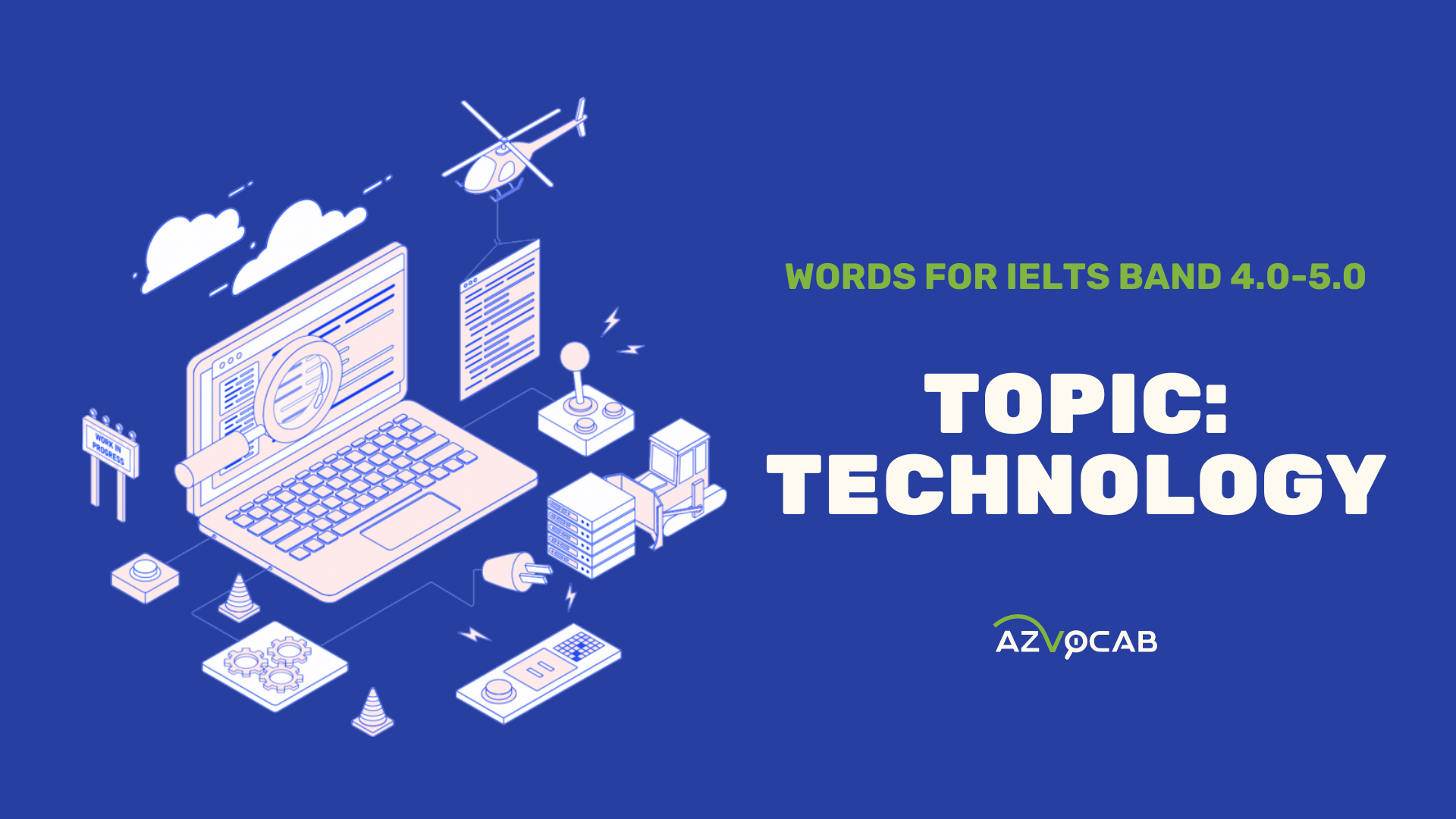Compilation of Common Words Topic Science and Technology for the IELTS exam

azVocab has compiled over 200 common words on the topic of “Science and Technology” for the IELTS exam. These vocabulary words can be used in all four sections of four skills: Reading, Listening, Speaking, and Writing. azVocab has carefully selected examples that fit specific contexts in IELTS exams. This will help you understand how to use these words in context, increasing the effectiveness of your vocabulary learning.
1. Vocabulary about science
| capsule (n.) – a small container with medicine inside that you swallow | These researchers are using nanotechnology to create a capsule that will release the medication slowly into the body. |
| cloning (n.) – the process of creating an exact copy of a plant or animal by using its cells | Cloning is a type of genetic engineering that uses cells from one organism to create a second living organism that is genetically identical to the first. |
| compound (n.) – a chemical that combines two or more elements | Now, our modern-day world of medical science is beginning to realise just how effective these phytochemicals, chemical compounds that occur naturally in plants, can be. |
| condensation (n.) – the act or process of changing from a gas to a liquid or solid state | Condensation will eventually cause the fabric of the building to rot away. |
| evaporation (n.) – the process of a liquid changing to a gas, especially by heating | In the tropics, this water is warmed by the sun and becomes saltier because of the higher rate of evaporation in the heat. |
| liquid (n.) – a substance, such as water, that is not solid or a gas and that can be poured easily | The compressed gas is cooled and condenses into a liquid. |
| petrochemicals (n.) – any chemical substance obtained from petroleum or natural gas | Our society is heavily dependent on oil-based goods such as plastics and petrochemicals. |
| prototype (n.) – the first example of something, such as a machine or other industrial product, from which all later forms are developed | In 1947 a prototype circled San Diego for more than an hour but later crashed in the desert. |
| reaction (n.) – an occasion when two or more substances react with and change each other | When assessing the toxicity of a substance, it is important to have a good understanding of how the different contaminants in the mix may interact both with one another and inside any creature which absorbs them. Sometimes these reactions make a substance more, or less, toxic. |
| tool (n.) – a piece of equipment that you use with your hands to make or repair something | The ability to create things out of cloth had as great an impact on society as the invention of tools. |
| organic (adj.) – (of a chemical substance) containing carbon | Because textiles are organic, they’re subject to biological deterioration from air, water, minerals, insects, and fungi. |
| combine (v.) – to (cause to) exist together, or join together to make a single thing or group | Hydrogen and oxygen combine to form water. |
| dilute (v.) – to make a liquid weaker by mixing in something else | We added water to dilute the mixture because it was too strong. |
| dissolve (v.) – (of a solid) to be absorbed by a liquid, especially when mixed, or (of a liquid) to absorb a solid | Pour the powder into the solution and stir it gently until the powder has dissolved. |
| manufacture (v.) – to produce goods in large numbers, usually in a factory using machines | Wood pellets manufactured by this process are suitable for use in both pellet stoves and pellet furnaces. |
| measure (v.) – to discover the exact size or amount of something | In the past, people were seen as either intelligent or unintelligent, and this was measured with an IQ test. |
| operate (v.) – to (cause to) work, be in action or have an effect | The new machines were not difficult to run. They could be operated by unskilled workers and turned out to be an inferior product. |
| penetrate (v.) – to move into or through something | At the height of totality, the fit of the sun and the moon is so perfect that beads of sunlight can only just penetrate the rugged valleys on the lunar surface. |
| pierce (v.) – to go into or through something, making a hole in it using a sharp point | However, if you pierce the balloon through the sticky tape, instead of bursting, the air will leak quietly and slowly. |
| release (v.) – to allow a substance to flow out from somewhere | Coal power stations release sulfur dioxide into the atmosphere. |
| repel (v.) – to have a magnetic field that pushes away something with a similar magnetic field | Similar poles of magnets repel each other, and opposite poles attract. |
| solidify (v.) – to change from being a liquid or gas to a solid form, or to make something do this | This could explain why rocks on the moon’s near side are richer in potassium, phosphorus and other elements that suggest they were among the last rocks to solidify out of the moon’s primordial magma ocean. |
| verify (v.) – to prove that something exists or is true, or to make certain that something is correct | Since Adler, there have been numerous attempts to verify the influence of birth order on a range of personality traits. |
| weigh (v.) – to have a heaviness of a stated amount, or to measure the heaviness of an object | This huge shellfish can live for more than 100 years and can weigh as much as two hundred kilos. |
| consist of (phr.v) – to be made of or formed from something | Atoms consist of positively-charged protons, negatively-charged electrons and neutral particles called neutrons. |
| industrial (adj.) – in or related to industry, or having a lot of industry and factories, etc. | The industrial revolution was happening everywhere. In the textile-producing towns of England, workers focused on the new weaving machines as the source of their troubles. |
| infinitesimal (adj.) – extremely small | The amounts of radioactivity present were infinitesimal. |
| magnetic (adj.) – using or relating to magnetism (= the power of being able to attract iron and steel objects) | Inductance is the ratio of total magnetic flux to the current through the device. |
| include (v.) – to contain something as a part of something else, or to make something part of something else | Examples include mixtures of petroleum hydrocarbons, metals and metalloids in mining and pesticides on or in the food we consume. |
2. Vocabulary related to technology, electronics, and telecommunications
| automatic pilot (n.) – a device that keeps aircraft, spacecraft, and ships moving in a particular direction without human involvement | Even flying a plane has been automated now. The automatic pilot is used for most of the flight. |
| computerisation (n.) – the process of starting to use a computer to do something that was done by people or other machines before | Furthermore, computerisation has led to fewer jobs and less human contact as many everyday transactions are now done by computer rather than manually. |
| cyberspace (n.) – the internet considered as an imaginary area without limits where you can meet people and discover information about any subject | You can find the answer to almost any question in cyberspace. |
| data (n.) – information, especially facts or numbers, collected to be examined and considered and used to help decision-making, or information in an electronic form that can be stored and used by a computer | I find the Optima downloads information a lot faster and it also has a bigger memory, so it can store more data. |
| device (n.) – an object or machine that has been invented for a particular purpose | Even in the most remote areas, people have access to some form of the communication device. |
| function (n.) – a process that a computer or a computer program uses to complete a task | I like the way the Smart Phone automatically displays a calendar when you open it up though, that’s a really useful function. |
| Internet (n.) – the large system of connected computers around the world that allows people to share information and communicate with each other | The introduction of the telephone last century changed our world, but today’s mobile phones and the virtual world of the Internet have revolutionised it. |
| keyboard (n.) – the set of keys on a computer or typewriter that you press in order to make it work | The Optima opens up to reveal a full keyboard inside. You can also scroll up and down by touching the screen. |
| keypad (n.) – a small set of keys with numbers on them used to operate a television, phone, calculator, etc., or the keys with numbers on them usually found on the right side of a computer keyboard | The Smartphone has a standard telephone keypad and I find them really awkward to use when I’m sending messages. |
| laptop (n.) – a computer that is small enough to be carried around easily and is flat when closed | I can access the Internet from anywhere in my house because my laptop has a wireless connection. |
| memory (n.) – the part of a computer in which information or programs are stored either permanently or temporarily, or the amount of space available on it for storing information | My computer has a gigabyte of memory. |
| monitor (n.) – a computer screen or a device with a screen on which words or pictures can be shown | The desk will also come with a compact-disc player and color monitor for viewing nature scenes on a computer break. |
| remote control (n.) – a system for controlling something such as a machine or vehicle from a distance, by using electrical or radio signals | The rocket went off course and had to be destroyed by remote control. |
| resolution (n.) – the ability of a microscope, or a television or computer screen, to show things clearly and with a lot of detail | As well as providing images with better resolution, today’s scanners also provide more comfort for the patient. |
| silicon chip (n.) – a small piece of silicon that is used in computers, calculators, and other electronic devices | The invention of the silicon chip meant that computers could be much smaller. |
| technology (n.) – (the study and knowledge of) the practical, especially industrial, use of scientific discoveries | At least communication technology in this digital age hasn’t let us down. |
| telecommunications (n.) – the sending and receiving of messages over distance, especially by phone, radio, and television | Technological advances in computing and telecommunications will reduce the need for many people to travel to work. |
| wireless connection (n.) – a computer network that uses wireless data connections between network nodes | Additional features include an IrDA interface for wireless connection and a locking switch for printer transport. |
| cyber (adj.) – involving, using, or relating to computers, especially the internet | To some extent they were right, especially when it comes to children and cyber addiction. |
| digital (adj.) – using or relating to digital signals and computer technology | Application software has been around for decades and allows the user to perform various tasks, such as document manipulation or modification of digital images. |
| electronic (adj.) – especially of equipment), using, based on, or used in a system of operation that involves the control of electric current by various devices | In the future, there may not be any books, magazines, or newspapers at all. Probably everything will be electronic. |
| handheld (adj.) – a handheld object has been designed so that it can be held and used easily with one or two hands | The communicating systems use e-mail, or wireless devices such as mobile phones, wearable computers, or the handheld variety. |
| portable (adj.) – light and small enough to be easily carried or moved | This ability to store tons of information in cell phones or digital cameras allowed us to keep computer technology portable. |
| powerful (adj.) – having a lot of strength or force | With the advent of more powerful mobile phones, a huge new field of mobile applications, or apps, has developed. |
| up-to-date (adj.) – modern, recent, or containing the latest information | People can also search the Web for the most up-to-date information from any part of the world. |
| user-friendly (adj.) – if something, especially something related to a computer, is user-friendly, it is simple for people to use | Modern software programs are so user-friendly that you don’t even need a great deal of computer knowledge to be able to use them. |
| virtual (adj.) – created by computer technology and appearing to exist but not existing in the physical world | Video game technology developed to the point where it became a $10 billion-a-year industry, producing games that invite players into a virtual world of fantasy, sport and even war. |
| automatically (adv.) – i a machine or device does something automatically, it does it independently, without human control | Site users can choose to install applications – software components that personalise their profile page. If one person adopts an application, their friends are automatically notified. |
| access (v.) – to open a computer file, a website, etc. in order to look at or change information in it | Developments that occurred at the start of the twenty-first century meant we could access all that information just by reaching into our pockets for our mobile phones. |
| connect (v.) – to join or be joined with something else | Anti-virus software is a must if your computer is connected to the internet. |
| download (v.) – to copy or move programs or information into a computer’s memory, especially from the internet or a larger computer | II featured a website where more than 14,000 people listened to any of songs by relatively unknown bands, rated them, and downloaded them if they wanted. |
| install (v.) – to put a computer program onto a computer so that the computer can use it | Do not download and install programs from websites that you are unfamiliar with. |
| operate (v.) – to (cause to) work, be in action or have an effect | The new machines were not difficult to run. They could be operated by unskilled workers and turned out to be an inferior product. |
| store (v.) – to put or keep things in a special place for use in the future | The data stored on the site makes it possible to analyse the growth in popularity of individual applications in unprecedented detail. |
| scroll (v.) – to move text or other information on a computer screen in order to see a different part of it | You can also scroll up and down by touching the screen. |
3. Vocabulary about characteristics and the development of science and technology
| invention (n.) – something that has never been made before, or the process of creating something that has never been made before | There have been many important inventions in the past 100 years, and they have changed our lives in dramatic ways. |
| patent (n.) – the official legal right to make or sell an invention for a particular number of years | Some 30 patents for flying cars were registered in the US patent office last century but none of these ideas has been transformed into a commercially available vehicle. |
| setback (n.) – something that happens that delays or prevents a process from developing | The electric car has seen both technical advances and also a number of setbacks, so. The jury is still out on its future. |
| vision (n.) – the ability to imagine how a country, society, industry, etc. could develop in the future and to plan for this | Our gadget-filled homes are a tribute to the various visions of the future: the microwave oven, internet fridges with ice-cube dispensers, freezers, video monitors, climate control, dishwashers, washing machines, personal computers, wireless connections and cupboards full of instant food. |
| compact (adj.) – consisting of parts that are positioned together closely or in a tidy way, using very little space | We have hundreds of compact, mid-sized, and luxury cars to choose from, all right on our lot. |
| automatic (adj.) – an automatic machine or device is able to operate independently of human control | The car, of course, has failed to live up to our expectations. It has been given turbo engines, DVD players and automatic windows, but its tyres stick stubbornly to the road. |
| computerised (adj.) – controlled by or produced by a computer, especially when something was previously done by people or other machines | Manufacturing processes have become increasingly computerized. |
| crucial (adj.) – extremely important or necessary | Creating a scanner that could produce images at a faster rate was crucial in the development of tomography. |
| cutting-edge (adj.) – very modern and with all the newest features | This cutting-edge, more sophisticated technology brought with it a whole new set of problems. |
| dated (adj.) – old-fashioned | This information is dated, so you cannot use it. |
| domestic (adj.) – relating to a person’s own country | The overriding message of the 1950s vision of the house of the future is that one can access the wonders of the future through the purchase of domestic technology today. |
| factual (adj.) – using or consisting of facts | Taylor carried out studies to ensure that factual scientific knowledge would replace these traditional “rules of thumb.” |
| fundamental (adj.) – more important than anything else | From the very beginning of the Information Age, having immediate access to data was fundamental to process. |
| industrial (adj.) – in or related to industry, or having a lot of industry and factories, etc. | The industrial revolution was happening everywhere. In the textile-producing towns of England, workers focused on the new weaving machines as the source of their troubles. |
| interactive (adj.) – an interactive system or computer program is designed to involve the user in the exchange of information | Some computer games are highly interactive. |
| labour-saving (adj.) – a labour-saving device or method is one that saves a lot of effort and time | In my view, the dishwasher is one of the greatest labour-saving devices. |
| simple (adj.) – easy to understand or do; not difficult | The first fire engines were simple tubs on wheels that were pulled to the location of the fire, with water being supplied by a bucket brigade. |
| up-to-date (adj.) – modern, recent, or containing the latest information | People can also search the Web for the most up-to-date information from any part of the world. |
| user-friendly (adj.) – if something, especially something related to a computer, is user-friendly, it is simple for people to use | Modern software programs are so user-friendly that you don’t even need a great deal of computer knowledge to be able to use them. |
| adopt (v.) – to accept or start to use something new | The majority of paleontologists and geologists adopted the gradualist theory of Earth’s history for more than 100 years. |
| attach (v.) – to fasten, join, or connect something | Until the late 1920s, airplane propellers were made of a single piece of wood attached at the center to the driveshaft of the engine. |
| enable (v.) – to make someone able to do something, or to make something possible | We now have mobile ground-penetrating radar working through close-spaced cluster-form sensors that enable us to digitally chart this famous landscape. |
| envisage (v.) – to imagine or expect something in the future, especially something good | Even in 1971, in his book Future Shock, Alvin Toffler envisaged a society awash with ‘free time’. |
| revolutionise (v.) – to completely change something so that it is much better | Advances in technology have done much to change the way we live and communicate, but no breakthrough revolutionised life as much as the advent of wireless technology, according to a panel of experts assembled by CNN in 2010. |
| speculate (v.) – to guess possible answers to a question when you do not have enough information to be certain | We need science fiction, more than ever, to speculate about the future of technology. |
| surpass (v.) – to do or be better than | These may no longer be considered cutting-edge but they have matched, if not surpassed, visions of how we would live. |
The Science and Technology topic is one of the most common subjects in the IELTS exam due to the strong development of science and technology. It is hoped that this article will help you enhance your vocabulary in this topic to successfully conquer the upcoming IELTS exam. Stay tuned for more articles on common vocabulary for the IELTS exam by azVocab!





